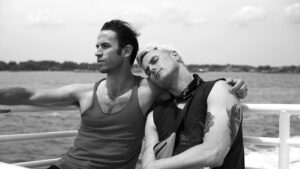At the beginning of the revelatory Belgian film Close, young Leo, whose parents own a flower farm, can think of nothing more than spending all his summer days with Remi, his friend and neighbor. Both boys are 13 and capable of endlessly entertaining each other — racing through fields, imagining battles with invisible threats, riding bicycles, and huddling together in bed during sleepovers, which happen night after night.

Remi, a talented oboe player, is more reactive and vulnerable. Leo is more of an instigator, and he eyes Remi with tenderness and fascination. Neither is particularly rebellious. Leo’s parents are tied up in their work, and his older brother helps out on the farm while Leo spends his time at Remi’s house. Remi is an only child, and his mom calls Leo her other son.
Then school starts, and everything changes. The other kids tease Leo about his closeness to Remi, suggesting that their relationship is gay — which it is, in a sexually innocent way, one that both boys’ families have embraced. But the self-consciousness of what their friendship means to their peers is instantly unwelcome to Leo. Remi remains oblivious.
Leo starts to push him away. He wrestles Remi off him when they’re next to each other in bed. The sleepovers end. Leo joins a hockey team on his own and leaves Remi at the playground to join other male cliques. Remi is devastated. First, he tries to put on a happy face. Then he acts out.
What happens to the boys and their families is the gist of this beautiful film directed by Lukas Dhont, which opened theatrically in December, was nominated for an Oscar as Best International Film, and is now available for streaming.
Dhont is yet another Belgian filmmaker (like Playground’s Laura Wandel) working in the style of the Dardenne brothers, using documentary realism, characters in moral crisis, and an intensely focused point of view. The performances by Eden Dambrine as Leo and Gustav De Waele as Remi are astounding in their emotional verisimilitude. Their pain, joy, guilt, and wonder are transparent, even when they try to hide their feelings. Yet the film’s emotional moments are never overdone.
Their friendship is neither sexual nor platonic — there’s a passion present that approximates romance. That is true of the two titular gay male adults of Chrissy Judy, a low-budget film partly shot in Provincetown that premiered at the Provincetown International Film Festival last year and is now available for streaming.

Chrissy (Wyatt Fenner) and Judy (Todd Flaherty) are 30-somethings who subsist in New York City without lucrative careers and perform together as a drag act, with a dismal lack of success. It’s a case of not having a constituency: Judy sings torch songs, eschewing the club music of today, and the two queens’ bitchy patter whizzes by so fast it resembles the private language of twins. No one laughs; no one cheers. Like Hedwig and her angry inch, they play loser gigs and are mostly ignored.
Unbeknownst to Judy, who works as a cater-waiter and seeks only sex instead of intimacy or relationships, Chrissy has plans for a more domestic life. He springs this on Judy suddenly, announcing his intention to move in with a boyfriend in Philadelphia. A trip to perform on Fire Island becomes Chrissy and Judy’s swan song, and Judy, feeling betrayed, resolves to turn himself into a solo act.
The next part of the film features Judy stumbling on his own, then visiting Chrissy in Philadelphia, which turns into a drunken disaster. The misanthropic Judy eviscerates Chrissy’s upwardly mobile friends and domestic lifestyle, and thoroughly embarrasses himself in the process. The friendship, it seems, has come to an end.
But Judy’s life has not. He heads off to Provincetown, working as a houseboy at a gay inn for the summer and performing nights as Sweet Lorraine, singing love songs as a regular in Ryan Landry’s Showgirls. This time out, a healthy confidence has replaced Judy’s sourness, and there’s a definite audience connection. Here in the fresh salt air of the Outer Cape, Judy seems to have found peace with himself — and, in a chance encounter, with his old friend Chrissy.
Flaherty, as Judy, is onscreen most of the time. He’s also the film’s first-time writer and director, and he has done a remarkably good job. The writing is half-baked at times, and the plot can be predictable, but the acting and directing are smooth and consummate. The dreamy black-and-white cinematography (especially at night) by Flaherty’s brother Brendan turns a low-budget production into a high-gloss affair. New York and Provincetown have never looked better.
Locals will have a fine time spotting recognizable locations and personalities, but the best fun of Chrissy Judy is soaking up the fulfillment of good friends. While the love between gay men and straight women continues to be a Hollywood cliché, it’s nice to see two gay men receive the same attention for a nonsexual relationship.



